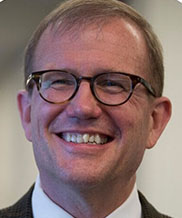A Wicked Problem About Thinking: Cognitive Security
The mediaX webinar series “Thinking Tools for Wicked Problems”, continues with Brian Pierce, a mediaX Distinguished Visiting Scholar. Wicked problems are typical of open, nonlinear systems that involve people and machines. Cognitive Security is such a problem. Cognitive Security is concerned with protection against malicious online and offline influence at scales ranging from individuals to nation states, and is foundational to national security inclusive of the public and private sectors. Cognitive Security is presented in terms of three core elements: resilience, situational awareness, and engagement. Examples of techniques and technologies for these elements are then discussed, which include critical thinking for resilience, detection and attribution of manipulated media for situational awareness, and human-machine teaming that engages disinformation at the scale and speed needed in today’s highly connected world.
In this talk, Brian will address this critical issue:
1. Cognitive Security is concerned with protection against malicious online and offline influence.
2. Cognitive Security is foundational to national security inclusive of the public and private sectors.
3. Three core elements define Cognitive Security and its techniques and technologies: resilience, situational awareness, and engagement.
Presenter

Brian Pierce is a master innovator and strategist in cutting-edge technologies. He is the former Director and Deputy Director of the Information Innovation Office at the Defense Advanced Research Projects Agency (DARPA) from 2014 to 2019. During this time, he developed and implemented the strategy of I2O, and drove advances in AI, data analytics and cyber in over 75 DARPA programs. The thrust of his work in AI was framed within the context of human-machine symbiosis, where machines partner with humans rather than serve merely as tools. The second thrust focused on analytical technologies rapidly transforming data and information into effective courses of action for conflict resolution, stabilization, and other complex challenges. The cyber thrust concentrated on technologies to help enable the deterrence of cyber threats to national security. Brian speaks on these topics at conferences and events worldwide. Brian brings over 35 years of experience developing breakthrough technologies over a career spanning DARPA and the aerospace/defense industry. Prior to joining DARPA in 2014, he was the Technical Director for Advanced Concepts and Technology in Space and Airborne Systems at the Raytheon Company. During his first tour at DARPA from 2005 to 2010, he served as the Deputy Director of the Strategic Technology Office, which encompassed a diverse set of domains including space, cyber, and renewable energy.